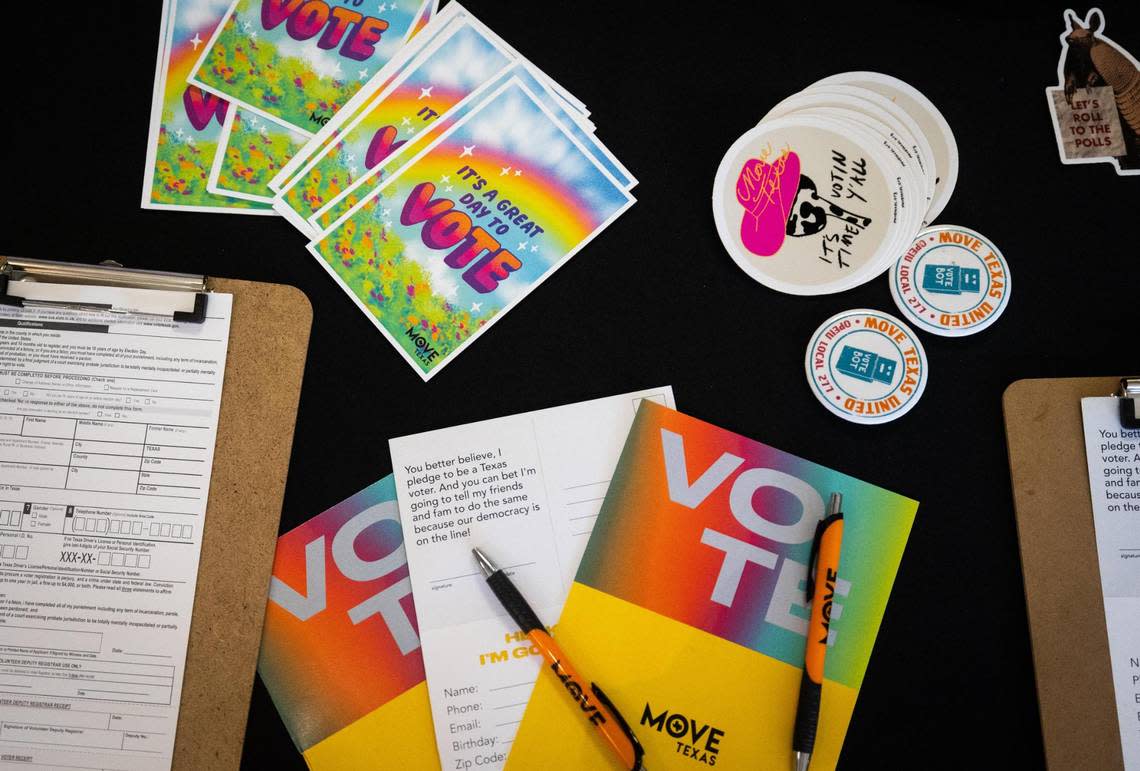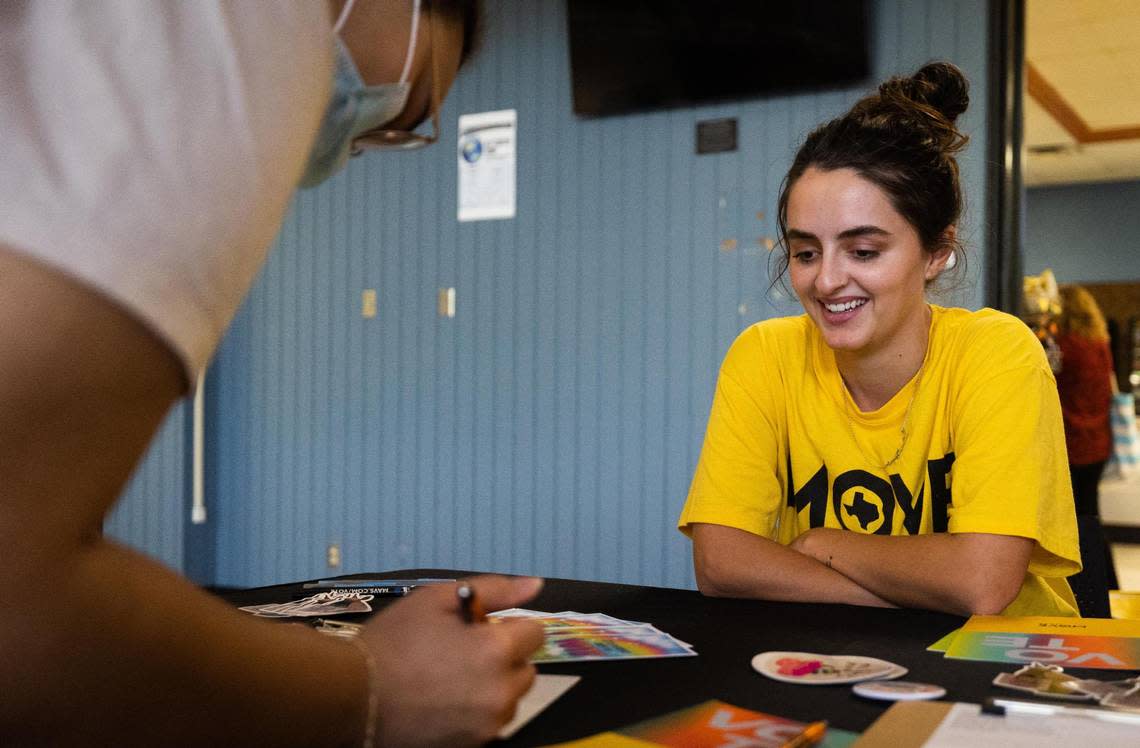Latinos are largely disenfranchised nonvoters in Texas. These efforts aim to change that
Jazmin Gonzalez had a hard time talking about voter registration because of the booming sound of Selena songs.
Gonzalez, a field canvasser for MOVE Texas, had a table set up in the dining hall at Tarrant County College South last week to talk to students about voting and to help them register.
The dining hall was the site of a Hispanic Heritage Month kick-off event, with free tacos and a live band performing covers of the late Tejana legend.
As students danced and the music blared, students came up to the table, and Gonzalez helped inform them about their civic duty, no matter how difficult it was to be heard over the music.
The event is just one example of many ways nonprofit organizations are trying to connect with and mobilize Latino voters in Fort Worth and Texas.
MOVE Texas and other voter mobilization groups set up booths at local bars, campuses and community events, do door-to-door canvassing and even register voters at quinceañeras.
As the Latino population in Texas and Tarrant County continues to grow, and as the 2022 midterm elections near, these organizations are trying to increase the civic participation of Latinos and combat what they see as decades of disenfranchisement.
Cristina Dolores Garrido, DFW regional manager for the Jolt Initiative, said she wants to see North Texas Latino people play a crucial role in the ever-changing Metroplex.
“Latinos need the space to be able to learn and grow,” she said. “To know that they have the right to vote and have the right to have a voice at the table.”
Turnout and voter restrictions
Community leaders and experts cite historical discouragement, state voting restrictions and a lack of local outreach among the many reasons the Latino community doesn’t vote in numbers reflective of its population.
The last midterm election in 2018 saw a “groundbreaking turnout” of Texas Latino voters, according to a report by The National Association of Latino Elected and Appointed Officials Educational Fund.
That year, more than 1.9 million Latino people in Texas took to the polls, about 10% of the entire voting age population in the state, an increase of more than 800,000 Latino voters from the 2014 midterms.
Still, the Latino vote in Texas turns out in much smaller numbers relative to the proportion of Latino people in Texas, said James Riddlesperger, political science professor at Texas Christian University.
This is mirrored locally. In 2020, turnout was 35% lower than the rest of the county in precincts where Latino people made up the majority of registered voters, according to Star-Telegram archives.
Less than half of registered voters in the area north of the Stockyards and south of Loop 820 — which is made up of 82% Latino people — cast a ballot in the past three general elections, according to Star-Telegram archives.
This has had ripple effects on representation at the state and local levels.

Latino people make up 35% of the Fort Worth population but are only represented by one city council member on the nine-member board.
Riddlesperger said the political power of the growing Latino population is minimized at the state level.
This is despite Hispanic residents potentially making up more of Texas’ population than white residents as of 2021, according to U.S. Census data.
“We have been slow to develop a long bench of Latino candidates who are going to be well-funded and are going to be able to take advantage of electoral leadership,” Riddlesperger said.
Dolores Garrido said decades of disenfranchisement have made voting more difficult for Latinos.
Riddlesperger said Latino people have been actively discouraged from voting throughout the state’s history, and it has been a struggle for these communities to see the effectiveness of their vote.
This, combined with legislative decisions limiting mail-in voting and imposing voter ID laws, have negatively affected Latino voters, he said, as Latinos are the least likely group to have a driver’s license.
Riddlesperger said the impact of the growing Latino population is mainly contingent on turnout.
“If Latino voters turned out in the same proportion as non-Latino white voters do in Texas, they would be one of the most powerful, maybe the most powerful, bloc of voters in the state,” he said.

Angelica Razo, Texas state director for Mi Familia Vota, said Latinos have to fight the narrative they are apathetic or don’t care about voting.
Dolores Garrido said a lot of the time, people just don’t know much about the candidates or how an election would affect them and their community.
“Most of these folks that we’re meeting have never been talked to by another campaign or anything else about voting,” Dolores Garrido said.
Efforts to mobilize
Dolores Garrido said organizations like the Jolt Initiative are working to connect in thorough and creative ways with the people who political parties have ignored.
Jolt focuses on reaching first-time voters through canvassing and setting up tables at local events, concerts, festivals and more. The group focuses on informing people about local elections for school board and city council seats.
Through a program called Poder Quince, Jolt gifts quinceañeras a free photo booth and provides on-site voter registration with guests as they line up to take their photos.
Dolores Garrido said her organization doesn’t just register people to vote and never see them again. It tries to maintain contact by being present at community gatherings.
“That’s what’s eventually going to get folks to come out and vote in November and in future elections, is that they feel empowered and respected,” she said.
Razo said Mi Familia Vota is trying to connect with over 100,000 voters in Dallas County.
She said has seen particular interest in voting from young Latino people and Latina women.
MOVE Texas has frequent voter registration tables at campuses and local establishments, and also does door-to-door registration with bilingual canvassers.
Dolores Garrido said it’s difficult to tell the impact of her group’s work through specific data and numbers, but it is important to see people who have never voted before being helped to do so.
“That anecdotal data is something that we really cherish and want to make sure that translating within our programs,” she said.
Not a monolith
Latino people typically are liberal on issues of social equity, opportunities for education, support for health care and support for civil rights, Riddlesperger said. But they tend to be conservative on social and religious issues such as same-sex marriage and abortion rights, he said.
“They may be casting votes for Republicans because of some issues while they agree with Democrats on others,” he said. “That makes it very difficult to guess how the Latino votes are going to shake out any given year.”
The majority of these nonprofits are nonpartisan.
Razo, the state director for Mi Familia Vota, said Mi Familia Vota is considerate of the fact that people worry about how their vote will be perceived.
She said her organization reaches out to people to engage them on topics and issues that affect their daily lives.
Razo said Latinos can and will decide elections.
That’s why Gonzalez, the canvasser for MOVE Texas, spent Thursday trying to speak over Selena songs at TCC.
She said she sees a local Latino culture that hasn’t promoted voting, and she wants that to change, especially among young people.
“People that do have the opportunity should [vote],” she said. “Everyday things that happen around us are things we can decide upon.”





